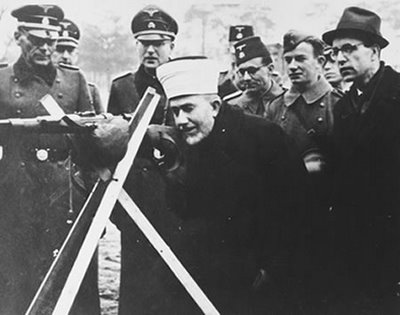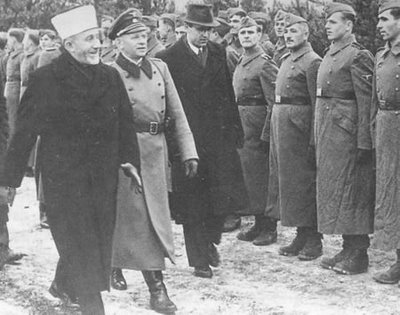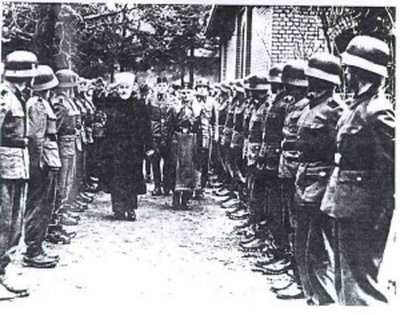


Nazis ‘shipped arms to Palestinians’
British National Archives unveil presence of Nazi S.S. agents in Mandatory Palestine, working closely with Palestinian leaders
Nazis planned Palestine subversion
British secret intelligence files have been released in London...
The Germans planned - with the support of the Grand Mufti - to arm Palestinian villagers and incite them to rise up against the Jews.

The Grand Mufti Of Jerusalem, Amin Al Husseini, meeting with Hitler to pledge support of the Arab-Islamic Ummah to the Nazi regime and to discuss the progress of the Muslim Nazi [Handschar] divisions, and to arrange the creation of death camps in the Arab world which would be his tools for the extermination of Middle East Jews.
In addition to meeting with Hitler, he sat down with Adolf Eichmann and sabotaged a plan to transfer Jewish children from Eastern Europe to Palestine.
Husseini (Husayni) was appointed mufti of Jerusalem in 1921. The title recognized his position as the major religious and political authority among the Palestinian Arabs.




189?
Amin Muhammed al-Husayni is born in Jerusalem.
November 2, 1917
The British Foreign Secretary issues the Balfour Declaration, announcing the British intention to permit the establishment of a Jewish national home in Palestine.
1918
British troops occupy Palestine.
February-April 1920
Al-Husayni and others organize demonstrations in Jerusalem, calling for Arab independence and union with Syria. After the demonstrations become violent, al-Husayni flees to Syria. In April, a British tribunal convicts him in absentia for incitement to revolt.
Autumn 1920
Pardoned by the British High Commissioner Lord Herbert Samuel, al-Husayni returns to Jerusalem.
May 8, 1921
High Commissioner Samuel appoints al-Husayni Mufti of Jerusalem. In 1922, al-Husyani becomes president of the Supreme Muslim Council and the administrator of the waqf (funds for repair and improvement of religious sites and institutions).
1922
Great Britain formally establishes the British Mandate in Palestine.
August 1929
Arab crowds enter the Jewish quarter of Jerusalem and initiate a wave of violence over access of Jews to the Western Wall for purposes of worship. Al-Husayni uses the incident to awaken general interest in the Arab world for events in Palestine and to promote his own position as a spiritual leader defending the holy sites of Islam against Jewish incursion. The violence leaves 133 Jews and 116 Arabs dead, and 339 Jews and 232 Arabs injured.
September 26, 1937
Arab insurgents murder the British District Commissioner of the Galilee. British authorities strip al-Husayni of his positions as Mufti of Jerusalem, president of the Supreme Muslim Council, and Administrator of the waqf. Al-Husayni flees to Lebanon in October.
September 1, 1939
Germany invades Poland, starting World War II. Increased French surveillance forces al-Husayni to leave Lebanon for Baghdad, Iraq, in October.
January 1941
Al-Husayni asks Hitler for a statement recognizing: 1) the independence of the Arab states from British and French colonial rule; 2) the right of the independent Arab states to form a union; and 3) the right of the independent Arab authorities in Palestine to eliminate the proposed Jewish homeland there.
April 1, 1941
Al-Husayni participates in a pro-Axis coup in Iraq. The new government, under Rashid 'Ali al-Kailani, deploys al-Husayni as the key contact to the Axis powers.
May 1941
Germany begins to supply al-Husayni, now in Baghdad, with payments to foment an uprising in Palestine.
May 9, 1941
Al-Husayni issues a fatwa in a radio speech from Baghdad, calling Muslims to engage in a holy war against Great Britain.
May 29, 1941
As British troops approach Baghdad, al-Husayni flees across the border to Iran.
June 1-2, 1941
As pro-British Iraqi troops enter Baghdad, Iraqi civilians perpetrate a pogrom, known as the Farhud, on the Jewish citizens of Baghdad. After 128 Jews are killed and 210 injured, British troops restore order.
July 1941
The German Abwehr establishes a German-Arab Training Department at a base near Athens, Greece, to train Arab volunteers for service as auxiliaries in the German Wehrmacht.
August 1941
Great Britain and the Soviet Union occupy Iran.
October 1941
Italian diplomats smuggle al-Husayni out of Iran to Italy.
October 27, 1941
Al-Husayni meets with Benito Mussolini, the Duce (Leader) of Fascist Italy. Mussolini agrees to a joint Axis statement along the lines of al-Husayni's proposal to Hitler.
November 28, 1941
Adolf Hitler receives al-Husayni in Berlin, a meeting covered by the German press. The Führer declines to issue any public declaration or conclude an agreement with al-Husayni regarding his January 1941 requests.
Early 1942
In collaboration with the Axis powers, al-Husayni begins developing themes for radio and print propaganda directed primarily at the Arab and Muslim world.
July 1942
Al-Husayni proposes a pan-Arab center in newly occupied Egypt to produce and disseminate propaganda, to carry out sabotage operations and incite rebellions behind British lines, and to train Arab regulars as the core of a liberating Arab army under al-Husayni's control. The Germans and the Italians reject this concept.
Late September 1942
Al-Husayni again proposes a pan-Arab center, this time in Tunis, to direct propaganda in Tunisia, Algeria, and Morocco. The Axis powers reject the plan.
November 8, 1942
In Operation Torch, Anglo-American troops land at Casablanca in Morocco and at Oran and Algiers in Algeria. Vichy French forces surrender.
December 18, 1942
At the opening of the Central Islamic Institute in Berlin, Al-Husayni denounces the Jews as the bitterest enemies of Islam. He accuses the Jews of provoking nations against each other and unleashing World War II. He calls on Muslims to liberate themselves from enemy persecution. Nazi propagandists provide major coverage of the opening and of al-Husayni's remarks. His speech is broadcast from Germany to the Middle East on December 23, 1942.
February 13, 1943
Hitler agrees to create the 13th Waffen-SS Mountain Division, later also known as "Handschar." Reichsführer-SS (SS chief) Heinrich Himmler authorizes recruitment of Bosnian Muslims for the division. In March and April, the SS Main Office sends al-Husayni to assist in recruitment efforts.
May 13, 1943
German and Italian forces surrender near Tunis, ending the war in North Africa.
May-June 1943
Al-Husayni writes to the Bulgarian, German, Italian, Hungarian, and Romanian governments, demanding they not participate in British efforts to transfer Jewish children from Hungary, Romania, and Bulgaria to Palestine. He suggests the children be sent to Poland. The Germans had already taken steps to halt the transports in March and April of 1943.
July 1943
The SS establish an Imam training school to prepare chaplains for the 13th Waffen-SS Mountain Division. Al-Husayni tells the trainees that Muslims would "never have a better or more loyal ally than the Greater German Reich."
February 1944
The Germans deploy the 13th Waffen-SS Mountain Division, now also known as the "Handschar" Division, in western Croatia and northeastern Bosnia.
June 6, 1944
Allied forces land on the Normandy coast of France (D-Day).
September-October 1944
Nearly 3,000 soldiers of the 13th Waffen-SS Mountain Division desert. Most of the rest mutiny in mid-October, refusing to transfer to Hungary to fight Soviet troops. Himmler dissolves the division.
November 2, 1944
At al-Husayni's suggestion, the German Foreign Office announces the formation of an Arab-Muslim army (to be composed of Arab and Muslim volunteers and Muslim and Arab soldiers serving in Axis forces) to counter the Jewish Brigade Group in the British army.
May 7, 1945
Al-Husayni flees by plane to Bern, Switzerland. Swiss authorities deny him asylum and turn him over to French authorities.
May 8, 1945
V-E Day, end of World War II in Europe.
May 29, 1946
Al-Husayni escapes house arrest near Paris and flies to Cairo, Egypt.
November 29, 1947
The U.N. General Assembly adopts the partition plan for Palestine, which terminates the British Mandate and facilitates the creation of two states, one Jewish and one Arab. Al-Husayni rejects this plan.
May 14, 1948
The State of Israel is established, a goal against which al-Husayni had worked his entire life.
August 1959
Al-Husayni leaves Egypt for Beirut, Lebanon.
November 1959
Al-Husayni addresses a secret memorandum to the leaders of all Arab states advocating Arab unity against "Jewish aggression and imperialism" and denouncing the partition of Palestine.
July 4, 1974
Al-Husayni dies in Beirut, Lebanon.
Iraq 1941
In 1941 there was a pro-Nazi coup attempt in Iraq. In May 1941, British forces were fighting to keep Iraq in Allied hands.
One of the Iraqi coup plotters was Gen. Tufah Khariallah. Tufah Khariallah is the uncle and mentor who raised SADDAM HUSSEIN.
ARAB/NAZI COLLABORATION IN WWII







"Our fundamental condition for cooperating with Germany was a free hand to eradicate every last Jew from Palestine and the Arab world. I asked Hitler for an explicit undertaking to allow us to solve the Jewish problem in a manner befitting our national and racial aspirations and according to the scientific methods innovated by Germany in the handling of its Jews. The answer I got was: The Jews are yours."
Former Mufti of Jerusalem Haj Amin al-Husseini in his post-World War II memoirs.
"The Mufti was one of the initiators of the systematic extermination of European Jewry and had been a collaborator and adviser of Eichmann and Himmler in the execution of this plan... He was one of Eichmann's best friends and had constantly incited him to accelerate the extermination measures."
Adolf Eichmann`s deputy Dieter Wisliceny in his Nuremberg Trials testimony.
Grand Mufti Haj Amin Al Husseini [Hitler's Mufti]
The Israel Palestine Conflict Pt2 Palestine and the Ottomans
Haj Amin al-Husseini and the Nazis
Islam and the Nazis







